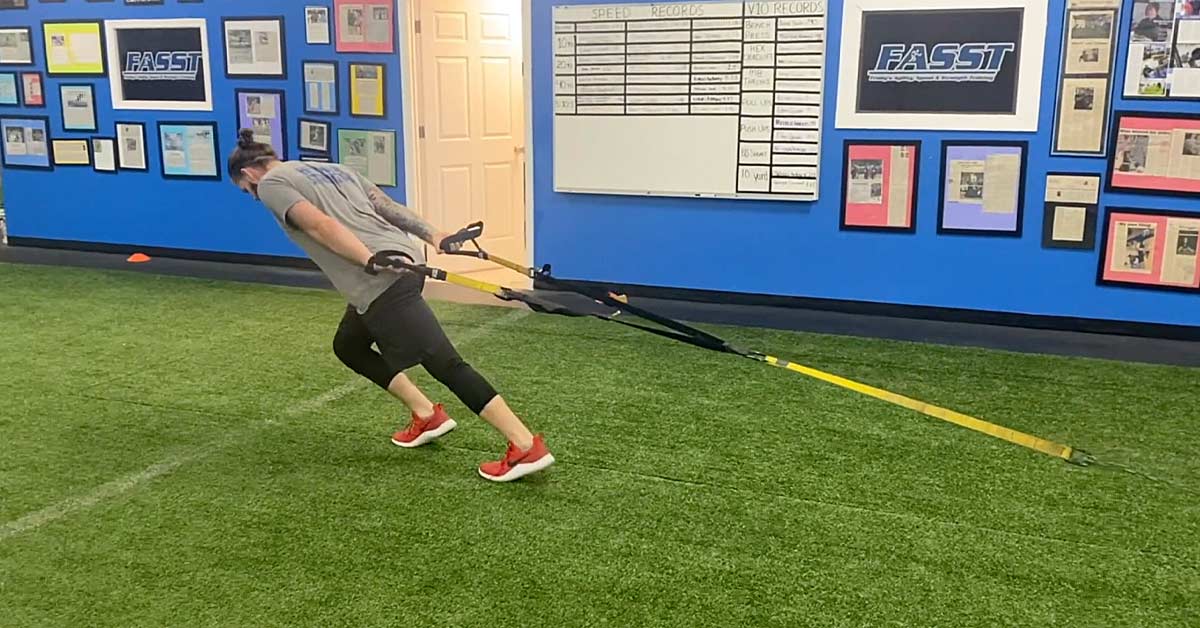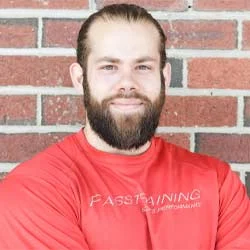Strength and conditioning in the private sector can provide a sustainable start to a coach’s career, allowing for more lifestyle flexibility, athlete accessibility, and programming freedom. After six years of coaching in the private sector, I know many of the skills and lessons I learned will carry me through the next phase of my career.
Even if you are working for someone else, taking responsibility for yourself as a business and developing your coaching craft is something the private sector doesn’t leave up to choice if you want to be successful. There are numerous facilities that have phenomenal continuing education programs and solid business structures already set in their foundation. Like anything, though, to excel at the profession, you have to use your own time to go above and beyond with additional continuing education and skill acquisition.
Taking responsibility for yourself as a business and developing your coaching craft is something the private sector doesn’t leave up to choice if you want to be successful. Share on XToday, I can appreciate my time in the private sector more because, while it may have been frustrating to have to learn and develop on my own outside of work, it laid a foundation for years to come. If you take responsibility and treat your work and yourself as something more—studying on your own, learning other skill sets, building a brand, and taking yourself outside of your comfort zone—then you will have more to show for it when it’s all said and done. I have also learned that six key learnings will help you build your brand.
1. Embrace Sales
By far, my least favorite thing to do while in the private sector was sales. I would wager that this is a shared hatred of many coaches, but it’s a necessary skill. I’m still no expert, but I did improve from where I originally started. Just becoming more comfortable with the discussion of money and the value of the program demonstrated improvement in itself. Tracking indicators such as monthly commissions, closing rates, contacts met each week, and the results of those contacts helped make my sales interactions more efficient and far less uncomfortable.
Sales is an essential skill that runs much deeper than just money: everyone in the field would be better off if they put down the book on advanced periodization principles in favor of a basic sales book from time to time.
Everyone sells. Whether it be a tangible good or service, your program to a head coach, or yourself to an athlete, selling is a large part of what we do every day. When we realize that sales isn’t a dirty word and we begin to value our skills and profession, the transition to becoming a professional will become easier. There are some amazing, established coaches out there who downgrade their value by offering their services for far less than what their education and experience would dictate in other fields.
Whether it be a tangible good or service, your program to a head coach, or yourself to an athlete, selling is a large part of what we do every day. Share on XCoaches should be compensated for their worth, like any job in any other respected field. The private sector allows you to learn sales and put it into practice daily. If I didn’t have the opportunity to fail at and learn in sales in the private sector, I know I wouldn’t be as good of a coach or as valuable of a staff member today.
2. People Are the Best Marketing
Like sales, marketing is something that I had no desire to be an expert in, but I had to develop and learn while in the private sector. Marketing depends on a host of variables that I cannot fully grasp, but for me, people have always been the best marketing tool.
I found success in first connecting to the people already in my network: my current and former athletes. Block off a small piece of time to email or direct message those clients for a quick check-in. I prefer this over a phone call because I am a millennial, but I also want this to be a quick conversation, and a 30-second phone call can be painfully awkward for all involved. Remember—this is just my preference and experience of what has worked for me.
All it takes is just being a decent person and reaching out to see how they are doing. Don’t bring up sales or the gym—unless they do—but make it clear that isn’t the reason for the contact. Some of these should already be paying clients, so it shouldn’t be stressful; just be genuine and leave it at that. Do this a few times a year (or more frequently, if appropriate), and I think you will be surprised what a little connection can do for a relationship and the marketing those individuals drive for your business.
3. Who’s in Front of You Doesn’t Dictate Your Value
Often, our abilities as coaches are judged by what athletes we train or what logo is stitched onto our T-shirts. This is just a micro-fragment of what defines a coach, and it doesn’t guarantee ability.
Like any job, there are those at all levels who are good…and those who are not so good. I have met amazing coaches with no Instagram following and who train middle school athletes all day. Each group of athletes presents unique challenges, and there is something to learn from everyone you step in front of.
Instead, coaches should be valued for their impact on their athletes and those they come into contact with. The physical improvements should still be considered when discussing impact, but just as a piece of it. Along with being mentors and supporters, the emotional and psychological elements should receive just as much praise—each piece is not as strong without the other’s support.
This occurs on all levels, and strength and conditioning coaches often wear several hats and must be excellent human connectors to be successful at their job. At the end of the day, whoever is in front of us deserves our respect and absolute best when it comes to coaching—whether they play on ESPN or are just trying to find their way in junior varsity sports.
4. Training Isn’t About Numbers
In the private sector, it’s important that your clients and athletes demonstrate improvements over time: people are paying you for a service and expect results. I learned, though, that in most cases, you are getting paid for something more important than numbers in a column.
While performance data has a place, training is about more than just the numbers. When sitting down with athletes and parents, you need to find their why. Why are they coming to you in the first place? Many of our athletes’ goals aren’t really to run a faster sprint time or to jump higher—it’s to improve in their sport, make the varsity team, or gain confidence and make themselves proud. They just believe that getting a faster sprint time or higher jump is the path to get there.
Yes, improved athletic attributes are a byproduct of that, but digging deeper to get to the roots of why and connecting to the individual’s emotional side is a recipe for a stronger connection. The cherry on top is improving the physical performance numbers as well, which will create a supporter for life.
5. Programs Must Be Flexible
Programming in the private sector offers some unique obstacles:
- Helping your athletes navigate around sporadic schedules.
- Having to adjust the plan due to their high school lifts or additional skill training sessions.
- Monitoring athletes who could be playing two to three sports at the same time.
It’s a never-ending science project most days, but it’s made achievable through flexible programming.
When programming for an individual or team, you must give yourself wiggle room. I have never been through a session from start to finish exactly as it was written. There is always some variable or exercise that needs to be adjusted to better fit the athlete at that time. Something that struck me early on was Strength and Conditioning Coach Joe DeFranco mentioning that it’s essential to write your programs in pencil, not pen.
The private sector will allow you to have flexibility in your programming and take control when needed. Having this adaptable mindset aids in the coach’s brand because it shows that you actually listen and care for your athletes’ needs but also are knowledgeable enough to execute an appropriate plan B or C. Doing this shows our loyalty to the athlete and not our own selfish egos.
This also bolsters your value as a coach because it demonstrates a skill set. People shouldn’t only be coming to you because of a great training program—you can find those easily with a Google search. They should be coming to you for your ability to manipulate and adjust that program to best fit the individual’s circumstances. Having a great recipe book doesn’t make you a great chef, and having the “world’s best” training program doesn’t make you a great coach. An adaptable mindset creates fewer headaches for you in the future and leads to more athlete success.
6. Fun Is a Training Variable
Fun is the unspoken training variable in the private sector. Especially for youth athletes, but even with older collegiate athletes, training isn’t part of their job, and they shouldn’t consider it an additional stressor. They should view it as a chance to better themselves and their team and also as a release from their day-to-day practices, schoolwork, and hectic schedules.
The art of coaching often gets placed behind the science, but ultimately this is what creates the greatest relationships with your athletes. In training, psychology will trump physiology. I am not saying that having sound training principles isn’t important, but in the private sector, your athletes are not forced to come to sessions—they can go anywhere they please. It is, therefore, critical that you create a relationship with them and have a fun and engaging training session.
Having purposeful training that happens to be enjoyable is not an impossible task. Share on XHaving purposeful training that happens to be enjoyable is not an impossible task. It’s essential to demonstrate not only the knowledge of why you’re doing specific drills or exercises but also the adaptability to make it relatable and reach the interest of the individuals.
I often put myself in the shoes of those I’m coaching, imagine how they would interpret this, and then reconstruct my presentation, my explanation, or the movement based entirely on that.
Moving On
I am incredibly grateful for the experiences the private sector offered. While building an extensive coaching resume, I also received a crash course in sales, marketing, and human relations.
Writing this isn’t so much a goodbye but more of an appreciation of how these six takeaways helped me prepare for the next step in my career. Looking forward, I have realized that regardless of the sector, I utilize these points every day in one way or another. Doing so helps me be a better coach for those I serve on and off the floor.
Since you’re here…
…we have a small favor to ask. More people are reading SimpliFaster than ever, and each week we bring you compelling content from coaches, sport scientists, and physiotherapists who are devoted to building better athletes. Please take a moment to share the articles on social media, engage the authors with questions and comments below, and link to articles when appropriate if you have a blog or participate on forums of related topics. — SF





